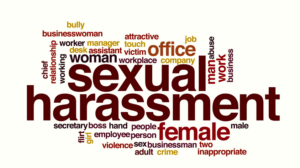 In Georgia, if you are injured while on the job your employer is required to pay workers’ compensation benefits to compensate for lost wages and medical expenses. Georgia also considers workers’ comp to be an exclusive remedy barring you from filing a separate lawsuit against your employer, essentially providing protection for them from any tort action. So, what if you are sexually harassed while on the job?
In Georgia, if you are injured while on the job your employer is required to pay workers’ compensation benefits to compensate for lost wages and medical expenses. Georgia also considers workers’ comp to be an exclusive remedy barring you from filing a separate lawsuit against your employer, essentially providing protection for them from any tort action. So, what if you are sexually harassed while on the job?
Exception to the Rule
Sexual harassment is an exception to the exclusive remedy rule and considered an intentional tort in the state of Georgia. More specifically, an exception may be made anytime a worker is injured by the intentional or willful act of another coworker. It must be strictly personal in nature and unrelated to work duties or activities.If the injury was related to work duties, the exclusive remedy provision takes over.
Title VII
Georgia has no laws prohibiting employment discrimination based on sexual harassment. Federal law Title VII, however, does prohibit sexual harassment for companies with 15 or more employees. If Title VII also prohibits retaliation against employees who oppose unlawful discrimination. It allows employees to sue for back wages, reinstatement or front pay, and fees incurred for attorneys. Employees also have the chance to receive compensatory and punitive damages. Federal law does not override state law claims for sexual harassment.
Unlawful Conduct
Sexual harassment is unwelcome conduct and becomes unlawful when the employee must endure the conduct to avoid being fired or the conduct is pervasive enough to create a hostile work environment.The harassment may take place on one occasion but by and large it is not reported until there is a long history—often because victims feel ashamed, scared, and worried they will lose their job. Some examples of conduct that would warrant a claim include repeated sexual advances, being lewd and suggestive, commenting about the victim’s sexual activity, and joking around about the victim’s physical appearance.If you want to form the basis of a strong sexual harassment complaint, then all advance must be unwanted.If the victim fails to object, then it gives the employer consent. An employer can be found accountable if they were negligent in stopping the conduct to take place. In other words, the employer can be forced to pay for the victim’s damages if they should have known the sexual harassment might be taking place (based on history with the offender) and did not stop it.
Prevention is the best way to get rid of sexual harassment in the workplace and employers must take the proper steps to deter and rectify such unlawful harassment.All employees should be informed that sexual harassment will not be tolerated, and an effective reporting process must be put into place.
Georgia has complex workers’ compensation laws but add to it an employer lawsuit and it can become nearly impossible to navigate on your own. It is recommended you contact a workers’ comp lawyer immediately so that you know your rights and the exact steps you should be taking with your sexual harassment claim.
